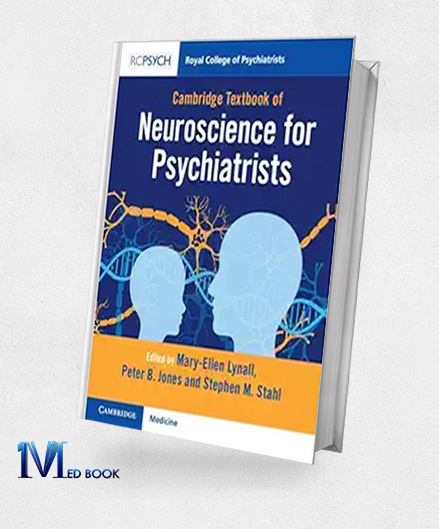Cambridge Textbook Of Neuroscience For Psychiatrists (Original PDF From Publisher)
Cambridge Textbook Of Neuroscience For Psychiatrists (Original PDF From Publisher)
$38.00
- The files will be sent to you via E-mail
- Once you placed your order, we will make sure that you receive the files as soon as possible
Cambridge Textbook Of Neuroscience For Psychiatrists (Original PDF From Publisher)
1.1.Description
Published in November 2023, The Cambridge Textbook of Neuroscience for Psychiatrists is a seminal work in the subject of mental health. This extensive volume, co-edited by Mary-Ellen Lynall, Peter B. Jones, and Stephen M. Stahl, provides a deeper knowledge of the biological basis of mental disease by bridging the gap between clinical psychiatry and neuroscience.

Cambridge Textbook Of Neuroscience For Psychiatrists (Original PDF From Publisher)
A One-Stop Shop for Information on Neuroscience
The goal of the Cambridge Textbook of Neuroscience for Psychiatrists is to serve as a “one-stop shop” for psychiatrists who want to learn more about the brain and how it correlates with mental health. The editors have put together a varied team of experts since they are aware of the wide range of methods and strategies used in neuroscience.
Basic neuroscientists, geneticists, psychologists, psychiatrists, neurologists, neurosurgeons, and endocrinologists are among those who fall under this category. This collaborative effort ensures the book presents a comprehensive and multifaceted perspective on the brain and its connection to mental health.
Put Translational Neuroscience First
The book’s emphasis on translational neuroscience is one of its main advantages. The goal of this field is to apply basic neuroscientific findings to clinical psychiatry in a useful way. The most recent research is highlighted in the Cambridge Textbook of Neuroscience for Psychiatrists, with a focus on how relevant it is to psychiatric practice both now and in the future. This guarantees that the data offered is useful for enhancing patient care in addition to being instructive.
Organization and Content
The Cambridge Textbook of Neuroscience for Psychiatrists takes a methodical, approachable stance in its organization. The chapters connect to the National Neuroscience Curriculum Initiative (NNCI) in the USA and correspond with the neuroscience syllabus of the UK’s MRCPsych.
This guarantees that the material addresses important subjects for working psychiatrists as well as trainees. Additionally, the book is highly illustrated, utilizing clear diagrams and figures to enhance understanding of complex concepts.
A wide range of subjects pertinent to the field are covered in the Cambridge Textbook of Neuroscience for Psychiatrists. The book delves deeply into the following important topics:
Neuroanatomy and Neurophysiology: The structure and operation of the nervous system are examined in this part to lay the groundwork. It investigates the complex network of brain areas, neurotransmitters, and neurons that underpin mental activities.
Genetics and Mental Illness: This book explores how genetic variants can increase vulnerability and risk for mental disorders by delving into their genetic foundation. Gaining an understanding of the biological foundations of different mental diseases requires having this knowledge.
Neuroimaging Methodologies: The article delves into the use of sophisticated neuroimaging methods, such fMRI and PET scans, in the identification and management of mental health disorders. This section highlights the potential of these tools to refine diagnoses and guide treatment decisions.
Neuropharmacology: This book explores the working principles of a range of psychotropic drugs, such as mood stabilizers, antidepressants, and antipsychotics. Comprehending the ways in which these drugs interact with the neurochemistry of the brain is crucial for efficient medication administration.
The neurological underpinnings of particular mental diseases are given considerable consideration in the Cambridge Textbook of Neuroscience for Psychiatrists. It investigates the relationship between mental health issues such bipolar illness, schizophrenia, anxiety, and depression and how the brain functions.

Cambridge Textbook Of Neuroscience For Psychiatrists (Original PDF From Publisher)
Advantages and Target Market
Within the topic of mental health, The Cambridge Textbook of Neuroscience for Psychiatrists serves a wide range of readers. It is an important tool for:
Psychiatrists: By providing them with up-to-date neuroscientific information, the book enables psychiatrists to create treatment programs for their patients that are more intelligent and grounded in biology.
Neuroscientists: The book offers a useful link between fundamental neuroscience studies and their therapeutic uses in psychiatry.
Psychologists: By providing a deeper understanding of the biological foundations of mental health, the book encourages a more comprehensive approach to treatment.
Other Healthcare Professionals: By offering a strong basis of neuroscientific knowledge pertinent to mental health care, the text can help other healthcare professionals, including nurses and social workers.

Cambridge Textbook Of Neuroscience For Psychiatrists (Original PDF From Publisher)
In summary
In the subject of mental health, the Cambridge Textbook of Neuroscience for Psychiatrists is a noteworthy contribution. The book equips medical practitioners with a deeper understanding of the brain and its function in mental health by bridging the gap between neuroscience and psychiatry.
In the end, this information results in better patient care, more individualized treatment plans, and possibly even advancements in the creation of novel treatments for mental illness.
Make sure that you are buying e-books from trustworthy sources. With over a decade of experience in the e-book industry, the Medbook1.com website is a reliable option for your purchase.
Categories:
Other Products:



Reviews
There are no reviews yet.